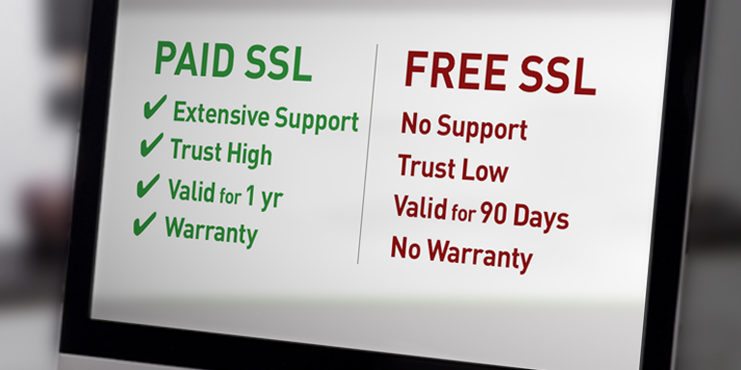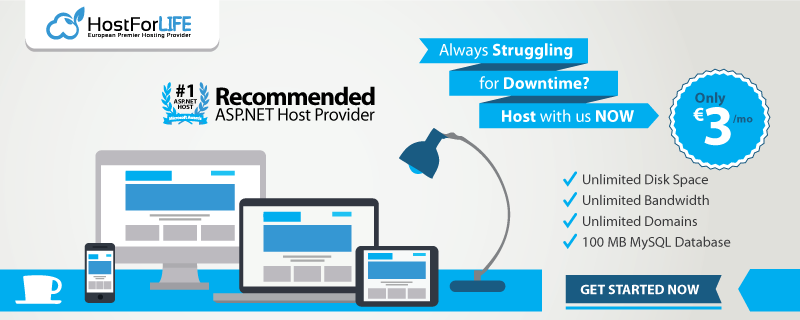Secure Sockets Layer (SSL) is the method of securing the communications between your website and your website visitors. In the past, these certificates were primarily used on e-commerce sites where online purchases were made and the credit card transactions needed to be secured. Back then you were looking for that trusty ‘https’ at the beginning of your URL that would let online shoppers know they were on a secure site.
The number of website owners who installed SSL certificates started increasing in 2018 since popular browsers like Google Chrome and Microsoft Edge began alerting visitors when a site is insecure regardless of whether or not it is an e-commerce site.
Because of this, small businesses (even those not transmitting sensitive information) are installing now SSL certificates to avoid that warning and potentially scaring off visitors. Basically, we’re moving towards an internet where almost every site is secured with an SSL certificate. And that’s a good thing!

Free vs. Paid SSL Certificate
The SSL industry is dynamic and continuously growing since businesses and people are present online now more than ever. Bloggers, e-commerce shops, and electronic wallets — all these businesses need to protect their websites and their users from cyber attacks, threats, and vulnerabilities. The range of paid SSL certificates has been adapted and diversified by Certificate Authorities to cover any needs — from basic websites to enterprises and banks.
Since Google made HTTPS and SSL SEO-friendly, free SSL Certificates gained great popularity. Although they offer only Domain Validation, there are still high hopes for this open source project. However, free certificates come with several limitations and disadvantages.
Disadvantages Using FREE SSL Certificate
Just like free web hosting services, free SSL certificates also come with certain limitations and risks:
- Domain Validation only — since these certificates come with no cost and are issued within a few minutes, they are limited to one single validation option — Domain Validation. This may be perfect for a small website or blog, but it’s not the best option for larger websites which are collecting personal information about their users.
- Unsuitable for e-commerce — free certificates are not recommended for securing credit card and personal information on e-commerce websites. To make customers trust your business, you need a certification of your authenticity, which is provided only by paid Business Validation or Extended Validation SSL Certificates.
- May hurt your customers’ trust — as a consequence of the above, your customers may not trust you simply because you aren’t willing to invest in an SSL Certificate issued by a reputable Certificate Authority. This lack of trust may significantly affect your reputation, especially in case of questionable CAs.
- Limited lifetime — free certificates are issued for a limited period of time, usually 90 days. On the other hand, paid SSL Certificates are offered for 1 or 2 years, so you don’t have to get them reissued and installed so frequently.
- Tardy customer support — free SSL issuers usually provide limited customer service, so issues aren’t resolved in a timely manner.
Why Use Paid SSL Certificate?
There are many reasons why you should opt for a premium SSL Certificate. However, the most important benefits are:
- Recognition — a certificate issued by a reputable Certificate Authority makes a website seem more reliable to any customer. With paid certificates, clients have the right to report any issue to the CA, which is obliged to immediately investigate them. As a result, clients feel safer having their backs ensured by trusted CAs.
- Different options — paid SSL Certificates are issued in all three validation options — Domain, Business, and Extended Validation. There are also different certificate types based on the complexity of the website, One-Domain, Wildcard, and Multi-Domain SSL Certificates, along with Code Signing SSL Certificates for securing downloadable software and digital goods.
- Extended lifetime — currently, paid certificates are issued for one or two years. This means that your business will run smoothly and your website will stay secured for a long time without you worrying about the renewal of your certificate.
- Server compatibility — premium certificates can be used on any hosting services as well as self-managed or dedicated servers, making the setting up process free of any limits.
- Liability protection — when purchasing an SSL certificate, you typically get a warranty which is an insurance that covers any damage incurred as a result of a hack or data breach caused by a flaw in the certificate. The warranty amounts range from $5,000 to $1,500,000 which means that the higher value — the more extensive the warranty is.
Final Verdict
Although free SSL certificates may seem a great and cost-free solution, they come with certain drawbacks. On the other side, paid SSL Certificates are more flexible and offer a wide range of benefits despite their cost, making them an excellent choice for any website.
We provide both Free and Paid SSL on our hosting environment. For Free SSL certificate, you can install directly via our control panel.
